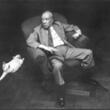El nombre de la rosa
(Libby/OverDrive eAudiobook)
Pochtar, Ricardo Translator
Gustems, Juan Carlos Narrator, Narrator
De la Ascensión Recio, Tomás Translator, Translator
Available Platforms
Description
Escucha ahora la novela más emblemática de Umberto Eco.
Una apasionante trama y admirable reconstrucción de una época especialmente conflictiva, la del siglo XVI.
Valiéndose de las características propias de la novela gótica, la crónica medieval y la novela policíaca, El nombre de la rosa narra las actividades detectivescas de Guillermo de Baskerville para esclarecer los crímenes cometidos en una abadía benedictina en el año 1327. Le ayudará en su labor el novicio Adso, un hombre joven que se enfrenta por primera vez a las realidades de la vida, más allá de las puertas del convento.
En esta primera y brillante incursión en el mundo de la narrativa, que Umberto Eco llevó a cabo hace ahora treinta años, el lector disfrutaráde una trama apasionante y de una admirable reconstrucción de una época especialmente conflictiva de la historia de Occidente.
Las mejores novelas de nuestro tiempo en formato audiolibro.
Reseña:«Aquí hay misterios turbadores, personajes vívidos, un retrato logrado de una época fascinante, humor sutil, sucesos inesperados y una prosa ágil que puede adaptarse a los registros de la fe, la duda, el horror, el éxtasis amoroso y la desolación.»David Lodge
More Details
Published Reviews
Library Journal Reviews
Readers of Greenblatt are likely to want more detail on, and immersion in, the world of libraries, scriptoriums, and the power of manuscripts. To fulfill this desire, suggest Eco's literary mystery set in a world similar to the one Greenblatt evokes, albeit in 1300s Italy. In a Benedictine abbey, the only known surviving copy of Aristotle's second book of Poetics seems to be at the center of a string of deaths. Brother William of Baskerville, a Franciscan friar, is asked to investigate. While William explores the labyrinthine library of the abbey, around him swirls the cultural climate of his age: the fear of and desire to control a manuscript, the Inquisition, and the powerful clashes between religion and politics. Erudite and ornate, satisfyingly complex and detailed, Eco's novel offers a multi-level experience of the play, and power, of language. - "RA Crossroads", Booksmack! 8/4/11 (c) Copyright 2011. Library Journals LLC, a wholly owned subsidiary of Media Source, Inc. No redistribution permitted.
Library Journal Reviews
Eco, an Italian philosopher and best-selling novelist, is a great polymathic fabulist in the tradition of Swift, Voltaire, Joyce, and Borges. The Name of the Rose, which sold 50 million copies worldwide, is an experimental medieval whodunit set in a monastic library. In 1327, Brother William of Baskerville arrives to investigate heresy among the monks in an Italian abbey; a series of bizarre murders overshadows the mission. Within the mystery is a tale of books, librarians, patrons, censorship, and the search for truth in a period of tension between the Papacy and the Holy Roman Empire. The book became a hit despite some obscure passages and allusions. This deftly abridged version, ably performed by Theodore Bikel, retains the genius of the original but is far more accessible. Foucault's Pendulum, Eco's second novel, is a bit irritating. The plot consists of three Milan editors who concoct a series on the occult for an unscrupulous publishing house that Eco ridicules mercilessly. The work details medieval phenomena including the Knights Templar, an ancient order with a scheme to dominate the world. Unfortunately, few listeners will make sense of this failed thriller. The Island of the Day Before is an ingenious tale that begins with a shipwreck in 1643. Roberta della Griva survives and boards another ship only to find himself trapped. Flashbacks give us Renaissance battles, the French court, spies, intriguing love affairs, and the attempt to solve the problem of longitude. It's a world of metaphors and paradoxes created by an entertaining scholar. Tim Curry, who also narrates Foucault's Pendulum, provides a spirited narration. Ultimately, libraries should avoid Foucault's Pendulum, but educated patrons will form an eager audience for both The Name of the Rose and The Island of the Day Before.-James Dudley, Copiague, N.Y. Copyright 1996 Cahners Business Information.
Library Journal Reviews
Eco's popular 1983 mystery here is bound with his 1985 Postscript to "The Name of the Rose," in which he describes the creation of the book and offers his theories of modern literature. This is the first paperback pairing of the two works. Copyright 1994 Cahners Business Information.
Reviews from GoodReads
Citations
Eco, U., Pochtar, R., Gustems, J. C., & De la Ascensión Recio, T. (2015). El nombre de la rosa (Unabridged). Penguin Random House Audio.
Chicago / Turabian - Author Date Citation, 17th Edition (style guide)Umberto Eco et al.. 2015. El Nombre De La Rosa. Penguin Random House Audio.
Chicago / Turabian - Humanities (Notes and Bibliography) Citation, 17th Edition (style guide)Umberto Eco et al.. El Nombre De La Rosa Penguin Random House Audio, 2015.
Harvard Citation (style guide)Eco, U., Pochtar, R., Gustems, J. C. and De la Ascensión Recio, T. (2015). El nombre de la rosa. Unabridged Penguin Random House Audio.
MLA Citation, 9th Edition (style guide)Eco, Umberto, Ricardo Pochtar, Juan Carlos Gustems, and Tomás De la Ascensión Recio. El Nombre De La Rosa Unabridged, Penguin Random House Audio, 2015.
Copy Details
| Collection | Owned | Available | Number of Holds |
|---|---|---|---|
| Libby | 1 | 1 | 0 |






























